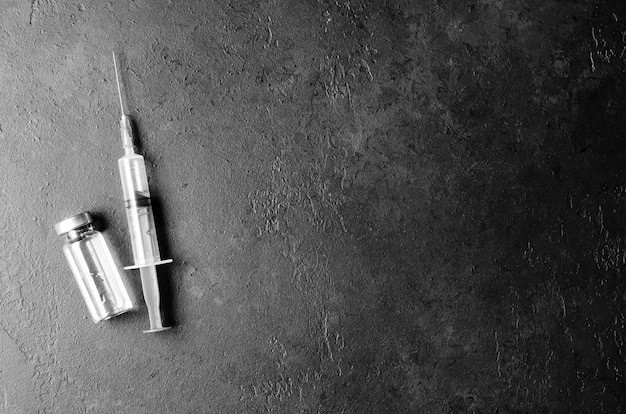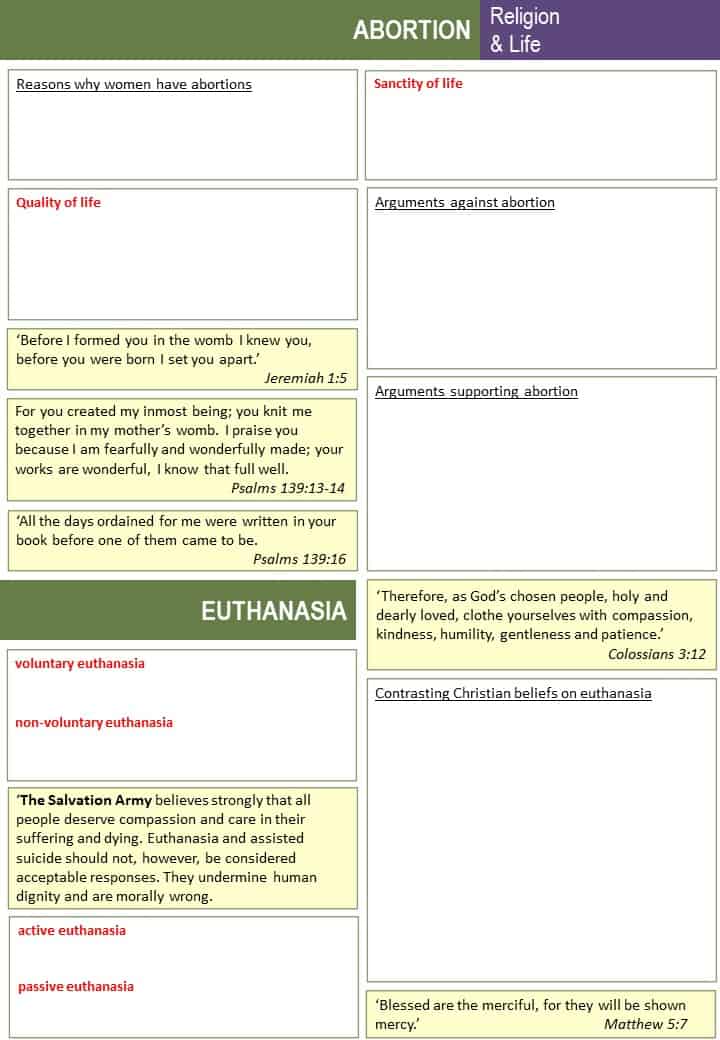Theme B
Religion & life
The concepts of sanctity of life and the quality of life.
- Abortion, including situations when the mother’s life is at risk.
- Ethical arguments related to abortion, including those based on the sanctity of life and quality of life.
- Euthanasia.
- Beliefs about death and an afterlife, and their impact on beliefs about the value of human life.
Abortion
Explain two contrasting beliefs in contemporary British society about abortion. (4)
Spec 1
Christianity
Roman Catholics oppose abortion/made in God’s image (Genesis 1:27)/life begins at conception/Exodus 20:13/God loves children (Matt 18:10; Luke 18:15–16)/most Protestants believe that it depends on the circumstances, abortion to save the life of the mother may be the most loving action.
Judaism
God creates life and knows us before we are born/Psalm 139:13, 15– 16/given vocation before birth: Isaiah 49:5 and Jeremiah 1:5/abortion is permitted for serious reasons as the lesser of two evils/Rabbis give guidance on when it is permissible/mothers are required to have an abortion if continuing with the pregnancy would kill them. Abortion on demand is not permitted.
‘Abortion should be allowed only when the mother’s life is at risk.’ (12)
2019
Arguments in support
• There are too many abortions for trivial reasons and should only be allowed to save the mother’s life. The mother’s life should take precedence over the foetus.
• Children are God given and every child has a purpose so should not be aborted.
• Children are the future and are a blessing.
• Life begins at conception so abortion is seen as murder and goes against the sanctity of life
• There are other options eg adoption if the child is not wanted.
• If it is believed that the baby will be born with disabilities, disabled people can live fulfilled lives.
• The mother might regret having an abortion later and feel guilty, etc.
Arguments in support of other views
• The woman’s circumstances should be considered eg may be pregnant because of rape or has been deserted by the father.
• The mother might not be able to cope emotionally or financially.
• The child might be unwanted and unloved eg it might ruin her career or it may have a severe disability.
• There is a need for compassion eg ‘Love thy neighbour’.
• The mother should have a choice as it is her body which has to go through the pregnancy.
• The current law has got it right, etc.
Christianity
Roman Catholics and many evangelical Christians believe that life starts at conception / created in the image of God – Genesis 1:27 / abortion goes against the sanctity of life and is therefore wrong except perhaps to save the woman’s life / ‘Before I formed you in the womb I knew you, before you were born I set you apart’ – Jeremiah 1:5 and also Galatians 1:15 / God is the creator – ‘For you created my inmost being; you knit me together in my mother’s womb. I praise you because I am fearfully and wonderfully made’ – Psalm 139:13–14 / other Christians generally oppose abortion but believe that it is acceptable in some circumstances eg if the pregnancy is the result of rape or if the
child would be severely disabled / the C of E and Methodists say that sometimes it is ‘the lesser of two evils’ and the most kind thing to do, etc.
Judaism
All life is God given and sacred / humans are made in the image of God – Genesis 1:27 / ‘Before I formed you in the womb I knew you, before you were born I set you apart’ – Jeremiah 1:5 / God is the creator – ‘For you created my inmost being; you knit me together in my mother’s womb. I praise you because I am fearfully and wonderfully made’ – Psalm 139:13–14 / abortion on demand is not allowed in Judaism and should be avoided if possible / but may be allowed if the pregnancy is the result of rape or incest / if the baby will be severely disabled / if the mother will suffer distress or ill
health / the mother’s life has precedence over the foetus / a foetus is not considered to be a person until it is halfway down the birth canal, so most Jews do not consider abortion as murder / if an abortion is to take place the earlier it is done the better, etc.
Euthanasia
Explain two contrasting religious beliefs about euthanasia. (4)
2018
Goes against the sanctity of life / seen by some as murder / God gives and takes life / playing God to end it / life is special and should be preserved/ it’s against the law and therefore wrong / can be seen as assisted suicide.
It is loving and compassionate to end suffering – all religions teach love and compassion / intention is to help, not to harm / voluntary euthanasia is the wish of the suffering individual / euthanasia by withdrawing treatment allows natural death / God doesn’t want people to suffer / people have freewill given by God / quality of life issues / euthanasia allows a ‘good and peaceful death’, etc.
Christianity
All life is sacred life and should end naturally / The Ten Commandments – ‘Do not kill’ / God gives and takes life / very few support active euthanasia but some do eg Dutch Protestant Church see it as an act of love and compassion / some may support passive euthanasia (ending of treatment) believing that doctors do not have an overriding obligation to prolong life by all means possible eg Church of England / Catholic teaching does not support any form of euthanasia / support the hospice movement, etc
Judaism
Life is sacred / The Ten Commandments – ‘Do not kill’ / God gives and takes life / active euthanasia is considered wrong as it actually causes death- murder / it is wrong to throw life away / passive euthanasia – shortening the act of dying, that is, not doing anything which extends or prolongs the pain is seen as acceptable by many Jews eg switching off of a life support machine / acceptable to give pain relief even if it will hasten death provided the intention is not to kill but to relieve pain, etc.
Explain two contrasting religious beliefs in contemporary British society about euthanasia. (4)
2020
Goes against the sanctity of life / Seen by some as murder / God gives and takes life / Playing God to end it / Life is special and should be preserved / It’s against the law and therefore wrong / Can be seen as assisted suicide / People change their mind / Relatives could pressurise a person to seek an early death so they can inherit his or her property, etc.
Christianity
All life is sacred life and should end naturally / The Ten Commandments – ‘Do not kill’ / God gives and takes life / Ecclesiastes 3:1-2 / Support given to the hospice movement allowing a sufferer to die naturally with dignity, etc.
Judaism
Life is sacred and precious / The Ten Commandments – ‘Do not kill’ / God gives and takes life / Active euthanasia is considered wrong as it actually causes death – murder / It is wrong to throw life away / Ecclesiastes 3:1-2, etc.
Resources
Videos









